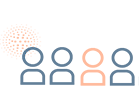Noonan Spectrum Disorders and RASopathies Precision Panel
Noonan Syndrome is a genetic disorder that impairs normal development of several parts of the body. The main features of Noonan Syndrome include unusual fascies (hypertelorism, down-slanting eyes, webbed neck), congenital heart disease, short stature and chest deformity.





